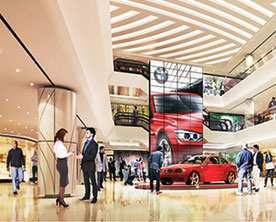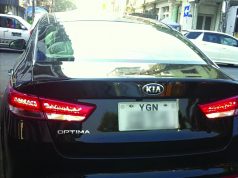Mixed-use development is a type of urban development that blends two or more of residential, commercial, offices, retail, hotel, cultural, industrial or entertainment uses, where those functions are physically and functionally integrated, and that provides pedestrian connections. Mixed-use development can take the form of a single building, a city block, or entire neighborhoods. The term may specifically refer to a mixeduse real estate development project – a building, complex of buildings, or district of a town or city that is developed for mixed use by a private developer, governmental agency, or a combination. The main difference between a mixed-use development and other developments is that there are separate interests in the different uses. In this fast paced today life, top property developers in Myanmar focus on mixed-use development projects to reduce transportation costs, to avoid traffic congestions and to use scare resources effectively, efficiently and sustainably. One of the biggest mixed-use development projects in Myanmar operated by Shwe Taung Development is Junction City located at the junction of Bogyoke Aung San Road and Shwedagon Pagoda Road. Shwe Taung Development is known for mixed-use large scale projects and its property types include mixed-use residential projects, commercial offices, industrial parks, shopping malls and residential township projects. Junction City is a world class development that comprises Grade-A offices, a 5-star luxury hotel, a state-of-the-art retail mall, entertainment complex and sophisticated high-rise serviced residences. It becomes a great place for local and international community to live, work and play.
Another famous mixed-use development project operated by Marga Landmark Development is ‘The Central’ mixed-use project. The project comprises of the first international retail promenade in Myanmar, grade-A offices, residential towers and a boutique shopping mall. It is situated at the corner of Kabar Aye Pagoda Road and Kanbe Road. Marga Landmark Development is the real estate wing of the Marga Group, one of the largest conglomerates in Myanmar. It focuses on high-end residential and mixed-use real estate developments in Yangon.
The Central rises up to be a world-class real estate development that showcases the beauty and urban vitality of the booming economic center in the ASEAN region. It was also the largest winner at the 2017 property awards ceremony. It will become an iconic landmark for modern, sustainable living and for the local and international community to live, work and play
The Kan Thar Yar Center mixed-use development project is owned by Asia Myanmar Shining Star Company, a joint venture between Yangon-based Asia Myanmar Consortium Development and Hong Kong-based Shining Star Investment Company. The project consists of four towers that include residential apartments, offices, a fivestar hotel and shopping centers. It is situated at the corner of Kanyeikthar Street and U Aung Myat Street, Mingalar Taung Nyunt Township.
During these days, successful property entrepreneurs mostly choose to invest in mixed-use developments because of the following benefits: they have greater housing variety and density, more affordable housing (smaller units), lifecycle housing (starter homes to larger homes to senior housing), reduced distances between housing, workplaces, retail businesses, and other amenities and destinations, better access to fresh, healthy foods (as food retail and farmers markets can be accessed on foot), more compact development, land-use synergy (e.g. residents provide customers for retail which provide amenities for residents), walkable neighborhoods, increased accessibility via transit, both resulting in reduced transportation costs and traffic congestions.
Common types of modern mixed-use zoning are
- Neighborhood commercial zoning – convenience goods and services, such as convenience stores, opened in strictly residential areas
- Main street residential/commercial – two to three-story buildings with residential units above and commercial units on the ground floor facing the street
- Urban residential/commercial – multi-story residential buildings with commercial uses on ground floor
- Office/ residential – multi-family residential units within office buildings
- Shopping mall conversion – residential and office units added to an existing standalone shopping mall
- Live/work – residents can operate small businesses on the ground floor of the building where they live
- Hotel/residence – mix hotel space and high-end multi-family residence
- Parking structure with ground-floor retail
Legal issues which are common to mixed-use developments no matter what legal structure is adopted are land ownership, licensing, insurance. Land may be owned by individuals, foreigners (35% rule) and joint venture. Mixed-use developments must have licenses from MIC or YCDC. Insurance is important particularly if any financing by banks (particularly international banks). Different interests may have different requirements – Hotel operators generally have global insurance policies which may restrict them to operating hotels (therefore cannot manage other common areas of commercial towers). Mixed-use developments projects owners should keep in mind the common legal issues concerning with ownership and development rights. A condominium can only be built on collectively owned land. Land must be 20,000 square feet and 40% can be sold to foreigners. Owner of land must transfer the land to collective ownership. In respect of the transfer of the land, the Law and Rules 18 and 19 only seem to contemplate two structures:
- Where the land owner is a joint developer and the ownership goes from the land owner directly to the collective owners
- Where the land owner sells the land to the developer who then transfers the land to the collective owners.
Ownership shall be transferred to the purchasers in accordance with the share value corresponding to original ownership/equity ratio.
If the development is undertaken by a joint venture company (JV Co), the profits are shared in accordance with a ratio agreed between the parties. It requires JV Co company incorporation, transfer of land from landowner to JV Co and JV Co becomes developer. As Myanmar is just beginning to develop large mixed-use developments, it will be impacted by global mega-trends in real estate developments. These mega-trends include rise of sustainable development, modern urban design, re-imaging retail space driven by rise in online shopping and re-imaging office spaces.










